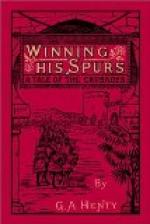Cuthbert hung his head a little.
“Ay, Father Francis, men; but I am a boy,” he said, “and after all, boys are fond of adventure for adventure’s sake. However, Father,” he said, with a smile, “no doubt your eloquence on the green will turn me mightily to the project, for you must allow that the story you have told me this morning is not such as to create any very strong yearning in one’s mind to follow the millions of men who have perished in the Holy Land.”
“Go to,” said Father Francis, smiling, “thou art a pert varlet. I will do my best on Sunday to turn you to a better frame of mind.”
CHAPTER V.
Preparations.
Next Sunday a large number of people from some miles round were gathered on the green at Evesham, to hear Father Francis preach on the holy sepulchre. The forest men in their green jerkins mingled with the crowd, and a look of attention and seriousness was on the faces of all, for the news of the loss of the holy sepulchre had really exercised a great effect upon the minds of the people in England as elsewhere.
Those were the days of pilgrimage to holy places, when the belief in the sanctity of places and things was overwhelming, and when men believed that a journey to the holy shrines was sufficient to procure for them a pardon for all their misdeeds. The very word “infidel” in those days was full of horror, and the thought that the holy places of the Christians were in the hands of Moslems, affected all Christians throughout Europe with a feeling of shame as well as of grief.
Among the crowd were many of the Norman retainers from the castle and from many of the holds around, and several knights with the ladies of their family stood a little apart from the edge of the gathering; for it was known that Father Francis would not be alone, but that he would be accompanied by a holy friar who had returned from the East, and who could tell of the cruelties which the Christians had suffered at the hands of the Saracens.
Father Francis, at ordinary times a tranquil preacher, was moved beyond himself by the theme on which he was holding forth. He did not attempt to hide from those who stood around that the task to be undertaken was one of grievous peril and trial; that disease and heat, hunger and thirst, must be dared, as well as the sword of the infidel. But he spoke of the grand nature of the work, of the humiliation to Christians of the desecration of the shrines, and of the glory which awaited those who joined the crusade, whether they lived or whether they died in the Holy Land.
His words had a strong effect upon the simple people who listened to him, but the feelings so aroused were as nought to the enthusiasm which greeted the address of the friar.
Meagre and pale, with a worn, anxious face as one who had suffered much, the friar, holding aloft two pieces of wood from the Mount of Olives tied together in the form of a cross, harangued the crowd. His words poured forth in a fiery stream, kindling the hearts, and stirring at once the devotion and the anger of his listeners.




